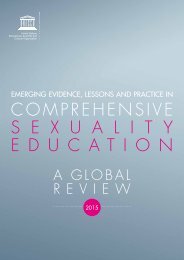Teacher
1WrsFvH
1WrsFvH
You also want an ePaper? Increase the reach of your titles
YUMPU automatically turns print PDFs into web optimized ePapers that Google loves.
graduates of a four-year course in education to earn 18<br />
units for a Master of Arts in Education, while ECEP is a<br />
six-week programme intended for CDWs, especially for<br />
those assigned in centres identified for conversion into<br />
Child Development Centres;<br />
d) Being an expected part of a teacher’s professional<br />
development, so that every teacher must take a certain<br />
number of hours/days of CPD every year in order to<br />
maintain his or her certification. For example, Singapore<br />
recommends 20 hours of CPD per year and Malaysia<br />
enforces 7 days per year of CPD for government teachers.<br />
In Timor-Leste, every three months during school<br />
holidays, teachers are required to attend a five-day CPD<br />
course based on the country’s teacher competency<br />
framework.<br />
e) Provided at the pre-school or cluster level both as a<br />
collaborative exercise as communities of practice among<br />
teachers facing similar challenges, and by external<br />
providers, such as sponsors of private pre-school systems<br />
or local teacher education institutions. In the Philippines,<br />
for example, the Commission on Higher Education<br />
authorises particular higher education institutions to<br />
provide summer in-service courses for early childhood<br />
teachers, some of whom receive scholarships to<br />
attend such courses. These are based on both National<br />
Competency-Based <strong>Teacher</strong> Standards and Individual<br />
Plans for Professional Development;<br />
f) Providing opportunities for teacher exchange<br />
programmes in different countries.<br />
As mentioned earlier, CPD programmes can also be<br />
designed to upgrade practising but underqualified early<br />
childhood teachers. Yet, there should be mandatory<br />
professional development days for all early childhood<br />
teachers, regardless of whether they are qualified,<br />
underqualified, or underperforming, although there may<br />
be additional/specific programmes for underqualified and<br />
underperforming teachers.<br />
13. Southeast Asian countries are encouraged to ensure that CPD opportunities are<br />
systematically and equitably provided.<br />
Providing a wide range of CPD programmes does not mean<br />
engaging in random activities, such as having a few days<br />
covering or reviewing one topic and a few days covering or<br />
reviewing another, depending on the interests of the local<br />
education office or else the funder or sponsoring agency<br />
of the CPD programme. In the Philippines, for example,<br />
the Department of Education created a CPD framework<br />
consisting of conceptual, theoretical and operational<br />
frameworks based on a needs assessment. It is important<br />
to ensure that CPD systems do not favour the already<br />
favoured urban, easy-to-reach institutions. For remote<br />
and other disadvantaged regions where access to CPD<br />
activities may be difficult, a variety of distance education<br />
approaches — such as by correspondence, online courses<br />
and the like — can be implemented to ensure that all<br />
practising pre-school teachers have an equal opportunity<br />
for CPD.<br />
If possible and where applicable, it is encouraged that<br />
CPD be:<br />
a) Free of charge to teachers, which is not to say that CPD<br />
should be free of cost to the centre/early childhood<br />
service provider;<br />
b) Purposefully designed to include the active participation<br />
of those receiving the additional training;<br />
c) Provided with enough space and time for “reflective<br />
practice,” peer learning and class-based exploration,<br />
such as action research;<br />
d) Developed to ensure the effectiveness of cascade<br />
systems of training, also known as train-the-trainer<br />
models, in which master trainers at the top of the system<br />
train a layer of trainers below, who then train another<br />
layer below and so on. Quality assurance must avoid a<br />
situation in which the message received at the bottom<br />
becomes much less detailed or accurate than that<br />
at the top.<br />
A prime example of a systematic CPD system is the Early<br />
Childhood Development Agency (ECDA) in Singapore,<br />
which has a CPD Masterplan to provide professional<br />
development opportunities for early childhood centre<br />
leaders and teachers based on a roadmap that outlines<br />
key competencies of various jobs in the ECD sector and<br />
support measures, such as flexible staffing requirements<br />
on days set aside for such training. Anchor operators<br />
which receive funding support from ECDA in Singapore<br />
must send their early childhood educators for 30 hours<br />
of CPD each year by private providers. In Cambodia, six<br />
full days of professional training for government schools is<br />
available from the Ministry, but is not mandatory.<br />
14



